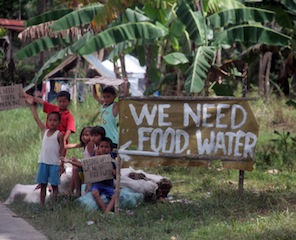The European Union is allocating €2.5 million (PHP 148 million) in humanitarian assistance to some of the 350,000 people who lost their homes and livelihoods during the powerful earthquake which shook the island of Bohol and surrounding provinces in Region VII (Central Visayas) on 15 October 2013.
The funding is being made available through the EU’s Humanitarian Aid and Civil Protection department (ECHO).
“We have seen the destruction and suffering caused by the powerful earthquake”, EU ambassador Guy Ledoux explained. “We stand by the people of the Philippines in this hour of need and this EU assistance reaffirms our commitment to immediately respond to the needs of the families affected by the disaster.”
The funding will be used to deliver emergency relief in the sectors of shelter, water and sanitation, primary health care and the management of evacuations sites.
Ambassador Ledoux said that two humanitarian aid experts (Mr Torben Bruhn, regional health coordinator of ECHO based in Bangkok and Ms Arlynn Aquino, humanitarian aid officer in the Philippines) trooped to the municipalities of Calape, Maribojoc and Loon in Bohol from 17 to 18 October 2013 to assess the priority needs of the affected population. During their visit, the experts noted that most of the houses collapsed and access to services was difficult. Primary health care and potable water supply was also limited because water pipes were broken.
Background:
On 15 October 2013, a 7.2 magnitude earthquake struck the central part of the Philippine archipelago causing significant damage mostly in the islands of Bohol, Cebu and Siquijor. Thousands of buildings and homes were destroyed, roads and bridges blocked, damaged or collapsed, power lines cut and water supplies interrupted. Over 200 people were killed, hundreds got injured and 3.1 million are affected. Around 350,000 people have been displaced with 80 per cent living in makeshift shelters outside their homes and in open public places (evacuation centers). Bohol and Cebu government authorities declared a state of calamity. ECHO deployed two experts within hours to the affected areas to conduct an assessment of the extent of destruction and the humanitarian needs of the survivors.
The Government of the Philippines is leading the relief operation, primarily focused on restoring roads, bridges, electricity and water systems, distributing food and water and providing psycho-social support. Nevertheless, substantial emergency needs remain on ground, and on 21 October 2013 national authorities welcomed the United Nations’ offer to contribute to the emergency interventions.
The EU has provided significant humanitarian assistance to the Philippines in 2013. In response to Typhoon Bopha (Pablo), €7 million were made available in February to help rebuild the devastated communities, in addition to the €3 million committed just after the cyclone hit South-Eastern Mindanao. Following flooding caused by Typhoon Trami (Maring) ECHO allocated €200 000 to help those affected, and further €300 000 in early October to assist those displaced by the fighting in Zamboanga.
photo by Rhaydz Barcia, PNEJ member
For further information, please contact:
Thelma Gecolea, Press Officer, EU Delegation Manila: 02 8595124
Mathias Eick, ECHO Regional Information Officer, Bangkok:+66-898115481
Latest posts by EnviroNewsph (see all)
- Global fund aimed at protecting nature and accelerate investment in conservation, launched in Canada - August 25, 2023
- Why ‘loss and damage’ is the most bitterly fought-over issue at COP27 climate talks? - November 18, 2022
- U.S. hands over P2.3M in equipment and wildALERT system to PH to protect wildlife - December 16, 2020

